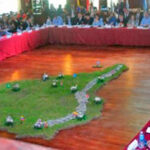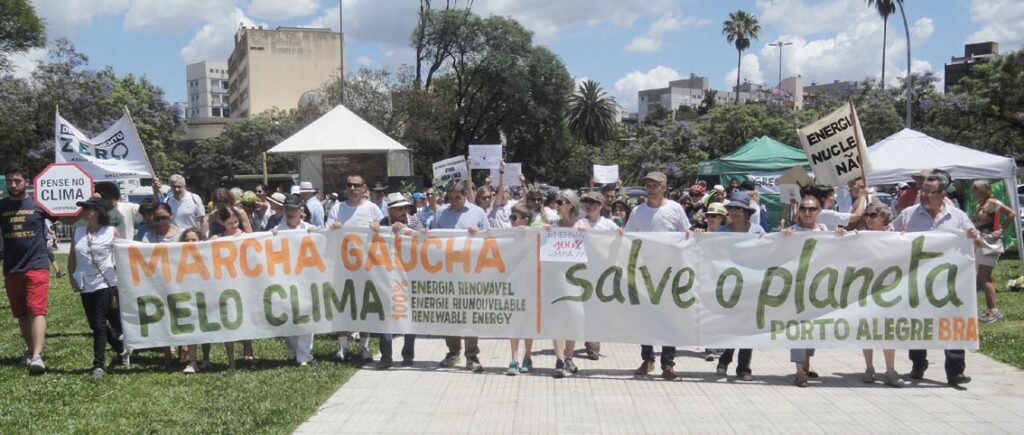Now Reading: Mercociudades: The Future of South America Goes Through Cities
-
01
Mercociudades: The Future of South America Goes Through Cities
Mercociudades: The Future of South America Goes Through Cities

Historically, cities have always played fundamental roles in the international arena. From the city-states of antiquity to contemporary urban centers, it is evident that local governments have been relevant agents for economic, political, and cultural development.
However, with the intensification of globalization and the strengthening of multilevel governance, cities have begun to act in a more structured manner on the international stage. This phenomenon, known as city diplomacy, refers to the direct action of local governments in the formulation and implementation of international policies, whether through cooperation networks, strategic partnerships, or advocacy with multilateral organizations. This diplomacy does not replace state action but complements it, bringing new dynamics to international politics, particularly in areas such as sustainable development, climate change, and human rights.
City networks have emerged as a response to the need for greater cooperation among local governments, allowing cities to share experiences, resources, and strategies to address common challenges. Since the 1990s, with the intensification of globalization and the increase in urbanization, these networks have become essential for multilevel governance and the formulation of transnational public policies.
The Mercociudades Network, created in 1995, represents one of the most significant examples of this model of collaboration in South America. Its central objective is to strengthen the participation of local governments in the process of regional integration, promoting initiatives in areas such as citizen security, sustainable development, and social policies. With over 360 member cities, representing approximately 120 million inhabitants, Mercociudades seeks to establish a dialogue channel between municipalities and other governance levels, influencing the formulation of regional policies and strategies.
This article analyzes how city networks, especially Mercociudades, influence the international agenda, highlighting their structure, historical evolution, impacts, and contemporary challenges.
The Role of City Networks in Multilevel Governance
City networks emerge as alternatives to the rigidity of traditional diplomacy, allowing for the exchange of experiences and the formulation of joint solutions to common problems. They are spaces of horizontal cooperation, where local governments can develop and share innovative strategies. These networks operate through the voluntary articulation of cities, forming decentralized mechanisms that favor coordinated public policies at the transnational level. Their growth has been driven by challenges such as rapid urbanization, climate change, social inequality, and the need for more efficient local governance.
Types of City Networks
City networks can be classified into three main categories:
Cooperation networks for projects: bring together cities interested in developing initiatives in specific areas, such as urban mobility, environment, and sustainability. This type of network allows for the exchange of experiences and the implementation of best practices in different urban contexts, including:
Economic articulation networks focus on the economic competitiveness of cities and the strengthening of business partnerships. These networks seek to attract investments, promote tourism, and stimulate local productive sectors, increasing cities’ integration into the international market.
Networks focused on public policies and social inclusion address human rights, public security, gender equality, and democratic governance. These networks influence local and international policies, strengthening the role of cities as relevant political actors.
The role of cities in the international arena is embedded in the concept of multilevel governance, which recognizes the interdependence between different levels of government. This means that, in addition to articulation among municipalities, there is a growing interaction with regional, national, and international organizations. In the case of Mercosur, the Mercociudades Network was a milestone in institutionalizing the participation of local governments in the process of South American integration, promoting cooperation among cities to solve urban and regional problems in a coordinated manner. This network has established itself as a strategic space to influence the formulation of regional policies, creating synergies between local administrations and supranational entities.
Mercosur and the Challenges of Regional Integration
South American integration, represented by Mercosur, faces a crisis of intergovernmental governance at the national level, which calls into question its ability to promote economic growth and efficient regional social development. Created in 1991 with the goal of strengthening trade and cooperation among member countries, Mercosur has been characterized by cycles of progress and setbacks. The dependence on the political interest of national leaders for decision-making has been one of the main factors limiting its effectiveness. The lack of institutionalization of supranational mechanisms and the absence of long-term policies have resulted in a fragmented structure, unable to respond quickly to the demands of society and local governments themselves.

The ideological crisis permeating South America has also impacted regional integration. Political alternation in member countries frequently redefines the bloc’s priorities, making it difficult to consolidate common and lasting commitments. This phenomenon has generated instability and the paralysis of strategic projects, weakening Mercosur as a space for coordination and joint action.
The integration model centered on nation-states, in the case of South America, has demonstrated its failure by not being able to address contemporary challenges such as social inequality, climate change, and urban governance.
In this context, cities and local governments are thrust onto the international stage. Subnational entities can contribute to reconfiguring regional integration. The action of city networks, for example, allows for the construction of bridges between local societies, promoting cooperation in areas such as infrastructure, culture, sustainable development, and technological innovation. By decentralizing governance, these subnational actors can fill gaps left by states, ensuring greater continuity and pragmatism in the formulation and implementation of regional policies.
Mercociudades exemplifies this potential by establishing connections between local administrations and promoting joint solutions to shared problems. Cities, by taking on a more active role, can redefine the future of South American integration, building a more flexible, dynamic, and needs-oriented model. Strengthening these networks not only complements state action but may represent a new phase of regional integration based on cooperation among urban territories and the strengthening of local societies.
Mercociudades and Its Influence on the International Agenda
Established in 1995, the Mercociudades Network has over 360 member cities, representing approximately 120 million inhabitants in South America. Its central objective is to strengthen cooperation among cities in Mercosur and promote regional integration. The network is organized into various thematic units, including citizen security, environment, urban mobility, and social development. In addition to its work on urban policies, Mercociudades has the potential to transform Mercosur into a model of social integration and innovation in local governance, promoting cooperation in areas such as social inclusion, culture, education, and collective well-being.
Despite progress, the Mercociudades Network faces significant challenges, such as lack of financial resources and the need for greater institutionalization of paradiplomacy in Mercosur member countries. Additionally, the diversity of political and administrative contexts among member municipalities can hinder the uniform implementation of joint policies. For this network to continue strengthening, it is essential to improve funding mechanisms, strengthen the political participation of cities in international forums, and expand articulation with other global actors.

Mercociudades can further consolidate as an instrument of innovation in multilevel governance, becoming a reference for Mercosur in social policies and human development. The formalization of permanent cooperation mechanisms between cities and the bloc could enable the creation of more effective regional solutions to shared urban problems, such as housing, transportation, and digital inclusion.
The Time for Paradiplomacy
The crisis of Mercosur reflects the exhaustion of the integration model based solely on nation-states, which are increasingly unable to formulate effective responses to contemporary challenges. The limited intergovernmental governance and ideological conflicts among member countries paralyze strategic decisions and hinder progress in building a solid and functional regional space. In contrast, cities have demonstrated greater flexibility and capacity for innovation, allowing for the articulation of concrete solutions to shared problems, such as climate change, social inequality, and sustainable development.
In this context, the rise of paradiplomacy becomes not only desirable but essential. City networks, such as Mercociudades, offer an alternative path for regional integration, based on direct cooperation among local governments and the implementation of policies oriented to the real needs of the population.
The green theory, by emphasizing the interdependence of ecosystems and the need for decentralized governance, reinforces the importance of local approaches to addressing environmental and social crises. Sustainability, from this perspective, cannot be achieved solely through interstate treaties but requires the active engagement of cities in formulating resilient and inclusive strategies. Thus, cities are not just supporting actors but protagonists in building a new model of South American integration, focused on decentralized cooperation, sustainability, and the strengthening of local societies.
Thus, even in the face of the impasse of traditional integration, the articulation among cities in Mercosur and beyond remains and must be strengthened, ensuring that regional cooperation continues to evolve from the local level.
Stay Informed With the Latest & Most Important News
-
 01Pepe Mujica: The Rich Legacy of the Peasant Who Knew How to Make Concessions to the Market Without Losing Ideological Direction
01Pepe Mujica: The Rich Legacy of the Peasant Who Knew How to Make Concessions to the Market Without Losing Ideological Direction -
 02Democracy in the Face of Ecological Collapse
02Democracy in the Face of Ecological Collapse -
 03New modelling reveals full impact of Trump’s ‘Liberation Day’ tariffs – with the US hit hardest
03New modelling reveals full impact of Trump’s ‘Liberation Day’ tariffs – with the US hit hardest -
 04New Pope Possesses Attributes That Could Expand Vatican’s Diplomatic Influence in Global Geopolitics
04New Pope Possesses Attributes That Could Expand Vatican’s Diplomatic Influence in Global Geopolitics -
 0550 years later, Vietnam’s environment still bears the scars of war – and signals a dark future for Gaza and Ukraine
0550 years later, Vietnam’s environment still bears the scars of war – and signals a dark future for Gaza and Ukraine -
 06What’s so special about Ukraine’s minerals? A geologist explains
06What’s so special about Ukraine’s minerals? A geologist explains -
 07China’s new underwater tool cuts deep, exposing vulnerability of vital network of subsea cables.
07China’s new underwater tool cuts deep, exposing vulnerability of vital network of subsea cables.













